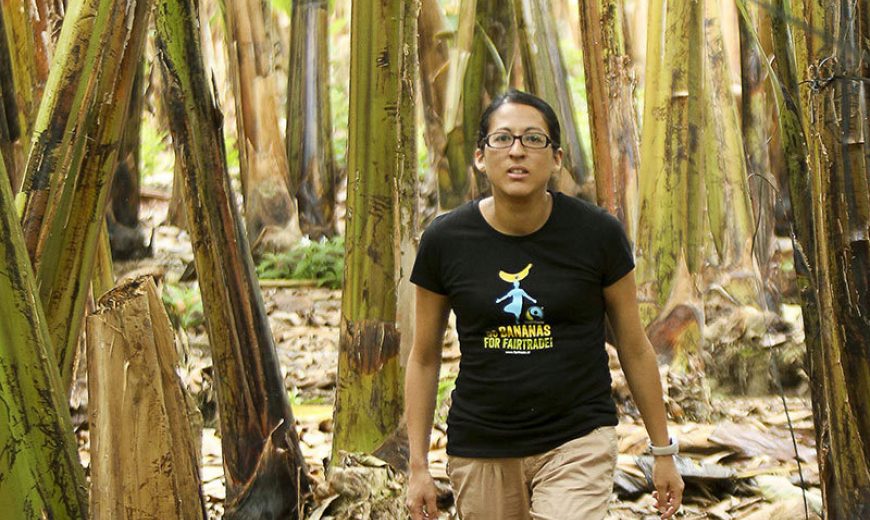2 Feb 2018
Pushing for More Gender Equity in the Banana Sector
An interview with Silvia Campos, Global Product Manager for Bananas at Fairtrade International and a member of the Gender Equity Task Force of the World Banana Forum.

Image © Fairtrade International
Like in other agricultural sectors, women employed in the banana industry are especially vulnerable to labour abuses such as lower salaries and discrimination in the workplace. For instance, women are more likely to suffer sexual harassment in the workplace, can be sacked for being pregnant and often do not enjoy ante or post-natal maternity rights.
In Fairtrade certified banana producer organizations, equal employment rights among female and male employees are the rule thanks to the strict social standards that organizations must comply with. But even in Fairtrade settings, challenges posed by inequity still persist – especially with regards to women’s lower participation in leadership positions.
In order to ensure that women enjoy the same rights and opportunities as their male counterparts, it is essential that all the stakeholders in the banana sector – trade unions, companies, government agencies and NGOs – work together. The World Banana Forum offers a platform for those different stakeholders to come together and join forces to foster the well-being and participation of women in the banana industry. Silvia Campos, Global Product Manager for Bananas at Fairtrade International, is part of the Gender Equity Task Force of the World Banana Forum – a specialist group formed to look at joint solutions to these challenges. Below she shares her views on these issues and discusses the work of the Task Force.
Which stakeholders are in the Banana Gender Task Force and what is the objective of this group?
Silvia: The Gender Task Force is made up of representatives of the principal trade unions, retailers, importing companies and NGOs. In total we are seven members. The Task Force was set up following the first Global Meeting of Women Banana Representatives in Ecuador in 2012, directly preceding the Second World Banana Forum Conference.
As a group, we have three main objectives: identifying the key challenges that prevent the advancement of gender equity, sharing best practices, and identifying interventions that can further enhance the empowerment and well-being of women in the banana sector.
What are the interventions that can enable positive change?
Silvia: We just published a booklet in November including real cases that have worked in practice. It was co-published by Bananalink and Fairtrade International. The publication, Progress towards Gender Equity in the Banana Industry, showcases eight inspiring case studies on how different stakeholders in the banana sector have supported the empowerment of women. In the booklet there are many different approaches but a common theme is the meaningful impact that can be achieved when women organize themselves to make and implement decisions about the issues that affect their lives at work, at home and in their communities.
Based on my own experience working with Fairtrade producer organizations, I think that self-organization of women is indeed key to improve the chances of success of any education and training programme on gender equity. Also, sharing experiences and best practices is crucial in order to learn from interventions that have been successful in other working places, regions and countries.
It seems that issues of inequality also persist in Fairtrade certified banana organizations. Why is that?
Silvia: Indeed, inequality is a widespread issue that also affects Fairtrade certified organizations, where most of the workforce and members of the cooperatives are male. A study by Fairtrade from March 2015 confirmed that women in Fairtrade certified organizations face barriers to their membership and leadership due to practices creating a bias towards men as well as the burden of unpaid care and domestic work which limits women’s free time. However, the research also showed that Fairtrade cooperatives can bring about positive change – such as introducing gender strategies that promote women’s involvement and activities that can develop skills and ownership. Comparing Fairtrade organizations with non-Fairtrade organizations, studies have identified that in Fairtrade certified small producer organizations women have had higher participation.
That said, we have a long way to go to enable higher levels of participation and well-being of women in the banana sector. And we need to be realistic: Fairtrade alone cannot achieve sector-wide change. We must join forces and work with the others stakeholders to jointly implement projects and interventions that can bring about long-lasting positive changes. This is why the work of the Banana Gender Equity Task Force is so important.
What are the next steps for the Task Force? Any upcoming projects and plans?
Silvia: Last November, we attended the multi-stakeholder strategy meeting on Gender Equity in the Banana Industry in Geneva. There, members of the Task Force together with the other participants in the meeting came up with a list of proposed strategies and activities. These interventions revolve around five key thematic areas: (1) employment opportunities for women workers, (2) women’s active participation in decision making, (3) gender pay gap, (4) health and safety with a focus on specific risks for women, and (5) sexual harassment and gender-based violence.
The proposals are now with the Steering Committee of the World Banana Forum and will be further discussed with WBF members to define plans for 2018. If finally approved, these interventions will be rolled out from the second quarter of 2018 onwards under the leadership of the WBF and through multi-stakeholder financing.
For more information about the Banana Gender Equity Task Force and Fairtrade bananas, please contact Silvia Campos at: s.campos@fairtrade.net
Silvia will be in Berlin to attend Fruit Logistica from 7-9 February. If you will be there and would like to discuss any issue related to Fairtrade bananas, please get in touch with her. Alternatively, you can visit us at the Fairtrade stand in Hall 26 E-21. We look forward to meeting with you!